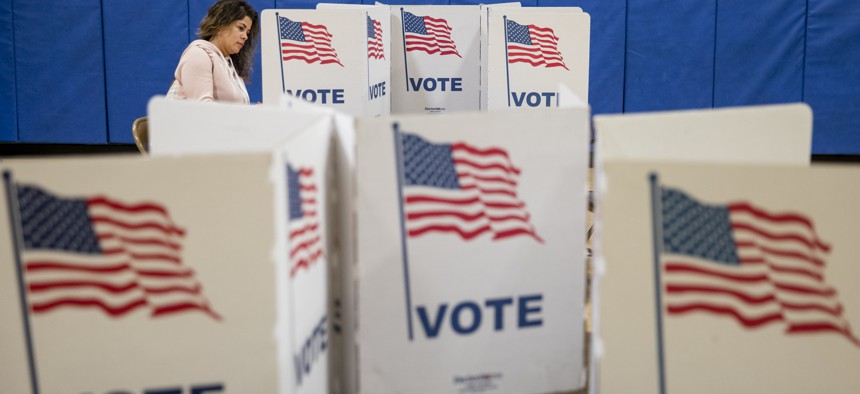States Take New Steps to Stop Election Mistruths From Going Viral

Photo by Samuel Corum/Getty Images
To combat the rising threat, some states are bringing on cybersecurity specialists to comb social media and flag posts that spread falsehoods about the voting process. Others have launched ad campaigns to counter disinformation.
In the run-up to the 2020 election, an alarming post appeared on Twitter describing thousands of ballots scattered across a Connecticut interstate after the truck carrying them crashed.
The tweet was shared many times, but the news was fake. Connecticut officials alerted Twitter, which removed the post.
But the episode illustrates the way false information can spread, potentially damaging the public's trust in elections and ultimately, eroding the democratic process, said Scott Bates, Connecticut’s deputy secretary of the state.
To combat the rising threat, the state this week brought on a misinformation specialist to comb social media and flag posts that contain falsehoods about the voting process. The state has also launched a $2 million ad campaign to make sure voters have accurate information.
“We thought it was important to have eyes and ears searching out there making sure malicious information doesn’t undermine people's confidence in the election,’’ Bates said. “It’s important for this election cycle, and it’s absolutely necessary in 2024, based on the kind of activity we saw in 2020 and knowing that there will be a national election with a lot of attention from malicious actors around the world trying to sell misinformation.”
Connecticut isn’t the only state taking new steps to fight election-related mistruths. Colorado Secretary of the State Jena Griswold created the Rapid Response Election Security Cyber Unit, a team of election security experts tasked with protecting the state’s elections from cyber-attacks, foreign interference and disinformation campaigns. California has an office of election security that is responsible for “keeping every Californian’s vote safe from online interference, especially the spread of mis- and disinformation.”
The National Association of Secretaries of State, which represents 40 chief election officials, also has a public education effort. “By driving voters directly to election officials’ websites and verified social media pages, we will hopefully cut down on the false information that can surround elections,’’ said Maria Benson, the group’s spokeswoman. “It is up to our members to customize this initiative to meet their state-specific needs.”
Some states have used their websites and social media accounts to provide accurate information about voting. Others are using billboards and running ads.
Republicans and civil liberties groups have raised concerns about free speech or the potential for conservative voices to be targeted.
Vin Candelora, the Republican leader in the Connecticut House of Representatives, said the hiring of a “misinformation cop” raises a host of questions. “This initiative deserves ongoing scrutiny to ensure it doesn’t devolve into a political witch hunt backed by the bureaucracy of state government,’’ he wrote on Facebook in June, when the position was first announced.
Connecticut officials say the misinformation expert won’t wade into partisan battles or assess the accuracy of a candidate’s policy positions. Rather the new hire will patrol mainstream social media sites, such as Facebook and Twitter, along with anonymous boards on fringe sites like 4chan to ferret out false information about voting before it spreads.
“We try to get the misinformation taken down before it goes viral because well-intentioned people can be passing along something that is patently false,’’ Bates said.
The new hire’s name was not released by the secretary of the state’s office, which cited concerns about the person’s security. The position pays $120,000 a year.
Daniela Altimari is a reporter at Route Fifty.
NEXT STORY: Nevada's Public Health Insurance Option Could Bring More Than $1B in Savings





